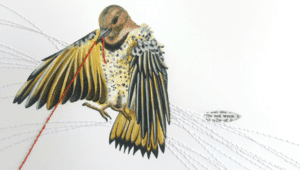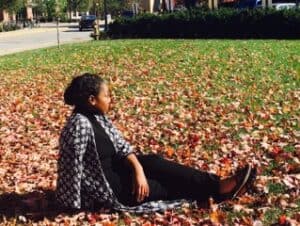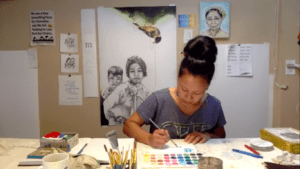 One year ago, Trinh Mai wrote this powerful letter to George Floyd upon his passing. We recently talked with the artist about where we are today in our fight for justice as well as about her own story of suffering, art, and calling people to discover beauty and purpose. Trinh Mai is a second-generation Vietnamese American visual artist who examines the refugee and immigrant experience, then and now. Since receiving her BFA in Pictorial Art from San Jose State University and furthering her studies at UCLA, Mai has continued exhibiting with works taking residence in public and private collections internationally. You can read her full bio here.
One year ago, Trinh Mai wrote this powerful letter to George Floyd upon his passing. We recently talked with the artist about where we are today in our fight for justice as well as about her own story of suffering, art, and calling people to discover beauty and purpose. Trinh Mai is a second-generation Vietnamese American visual artist who examines the refugee and immigrant experience, then and now. Since receiving her BFA in Pictorial Art from San Jose State University and furthering her studies at UCLA, Mai has continued exhibiting with works taking residence in public and private collections internationally. You can read her full bio here.
You have said, “I believe in the power of storytelling and art and its ability to repair the irreparable.” Talk to us about the power that art has in conveying concepts and values and ideas that words sometimes cannot.
Art can have a way of drawing the viewer into conversation without being too imposing. The work suggests an idea, a feeling, an experience, and then it relinquishes control over to the viewer. It is an invitation to approach with one’s own life experiences.
When curiosity is ignited, understanding is sought after. Now the conversation begins.
Art can soften the edges of themes that may be difficult to confront. A seemingly lifeless bird lay upon its back, feet pointing toward the sky, wings folded at its side. What is it doing? Is it resting? The didactic tells a more concentrated story: It is exhausted amid the fight for life. Although having migrated from another environment, it has nested here for nearly all its life, and now unjust systems seek to clip its wings.
These conversations can help bridge our experiences in time and in hope, and has the potential of mending the fractures that can be caused by misunderstanding, unawareness, and apathy.
We hear stories of unassuming individuals who rise in leadership when circumstance calls for it. We read about the confidence and momentum they gain as they keep the righteous cause in their eye line, and progress in their periphery. Art can offer us a lifeline through these stories, and help us believe that we are a part of them. We have witnessed these stories in our own lives and in the lives of others. And they have been documented in the Book of Life to remind us should we forget.
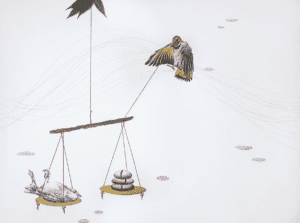
How Long, 2019. Acrylic, charcoal, gouache, hand embroidery, pressed leaves, scripture, and tree bark on paper. The fragmented scripture reads: “And they cried with voice, saying ‘how long’. Many men died. Was found without fault. He has judged who corrupted. Woe is past. Behold, woe is past. Do not weep. Know that our brother has been set free. Those who dwell will marvel.”
How Long, detail
What has your artistic journey been like, and how has it helped form you into the person you have become?
Early in our marriage, my husband was wrongfully convicted of a crime for which he was sentenced to over nine years in prison. We sank into hopelessness and a thundering rage, having been preys of such vile injustice. It was in this inconsolable devastation that we surrendered our lives to Christ. We had nowhere else to turn.
My heart was a gaping wound, and God healed that wound with his faithfulness and with art. Art called me to step out of my immense grief and meet with God. My first solo exhibition was titled “Conversations with God.” This faith remains the foundation of my art practice.
My work documents prayers for sufferers everywhere. For the children and the ones I love. For the sick and the lost and the lonely. For healing. For forgiveness. For God to reveal truth to us bountifully. For a strength that is fused with grace and wisdom as we navigate through a hostile world. For a growing understanding of who I am, my place in the world, an in thanksgiving for the great inheritances that we’ve been granted.
As a second-generation Vietnamese American, you speak boldly to the issues of immigration. What can we as a church learn from our immigrant and refugee neighbors, and about God and his constancy and faithfulness?
I grew up in a family of believers. During the war in Việt Nam, they escaped with their hearts set upon freedom of religion, freedom of speech, and freedom from violence.
My heart ruptures when I hear people, especially those who claim to follow Christ, speak in uncompassionate tones [in blanketing statements] toward our immigrant neighbors. Everyone has a different story. Have we forgotten that Christ was a refugee? Upon fleeing the persecution that would erupt in his birth land, he and his family sought refuge in Egypt before migrating back and settling in Nazareth.
Today, some of us do not have the option to return. For some war refugees, like the Vietnamese Americans who are currently facing deportation, there is a risk of being stigmatized as a traitor and returning to hostile conditions if deported back to Việt Nam. Are we not to give others a chance, as Christ has given us, time and time again?
This anti-immigration rhetoric is grounded in fear. I do not believe that this fear is of God. God gives us courage to love and to trust in his provision and providence. Are we to believe that if we take care of our neighbors, that God will not only replenish the well, but furthermore, bless us for being obedient in showing compassion to our neighbors (Acts 20:35)? Doesn’t our faith tell us this? We are commanded by God to love our neighbors.
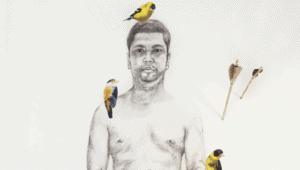
Flesh of my Flesh, 2020, detail, Belle’s acrylic, charcoal, dirt collected from the garlic fields in which my husband Hiền and his family labored with other immigrant families when first arriving in America to be compensated one dollar per bucket harvested, holy water, ink, Pacific Ocean water collected from the harbor of San Pedro, where Hiền served time in the immigration detention center, and tears shed for him as I considered the hardships that he has endured on paper; arrows crafted with indigenous methods using found branches, found feathers, found string, and wax. Learn more.
You have said, “Out of tragedy is ever born the blessings that we might have never been able to predict could or would come.” What are the blessings that come from tragedy?
I refer to our belovèd Joseph, who was sold into slavery by his own brothers, was wrongfully accused, and imprisoned. God gives him the gift of interpretation, and in his right time, grants Joseph great favor, seating him at the right hand of Pharaoh. Joseph tells his brothers, “But as for you, ye thought evil against me; but God meant it unto good, to bring to pass, as it is this day, to save much people alive” (Gen. 50:20).
Our faith tells us that we are assured God’s blessings when we serve God in sincerity and in love, and serve others as an extension of this love for God. These hardships are a surety in the human experience, derived from the fall. But in the turbulence, in our desperation and brokenness, God draws us to himself, cloaks us with a love that is unmatched by any other, and comforts us in unbearable circumstances.
This is when God does his greatest work. As we are buried in the rubbles of catastrophe, he pull us out of the ashes and cradles us, revealing to us his greatness as he calls us to new life.
As we pass the one year mark of the killing of George Floyd, we share this letter to him that you wrote a year ago. What is the role of the church as we keep the voice of justice ringing loud and clear?
It saddens me deeply to witness the lack of mercy, compassion, and love that I have seen in some Christian circles. As believers who glean divine wisdom and truth from the Word, we ought to remember that we are called to serve as a light unto others (Matt. 5:14). To care for the widows and the orphans (James 1:27). To practice gracious generosity in love, care, and empathy with others as we know not how they may be suffering (Ecc. 11:1-4). To plead the cause of the poor and the needy, and to speak and stand for those who cannot do so for themselves (Prov. 31:8-9).
Rev. Martin Luther King, Jr. stood upon these moral responsibilities. He believed that God was using him to lead the march toward equality, and did so in confidence because he leaned upon the strength, the justice, and the promises of God.
When we witness injustice, we can find comfort in remembering that true justice derives from God. We can remember that true Christianity is strong yet meek, courageous, and victorious. Our faith tells us that the oppressors do not go unpunished. We can be assured that our holy God reigns over all these issues, and will judge righteously. This ought to give us hope in knowing that justice has been promised. Perhaps not in this life, but in the next.
The LORD also will be a refuge for the oppressed, a refuge in times of trouble. – Psalm 9:9

